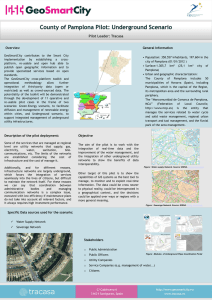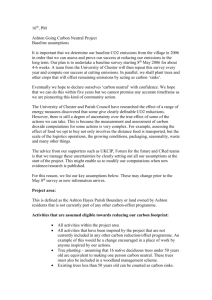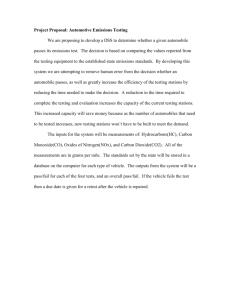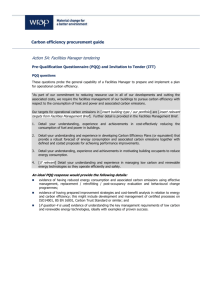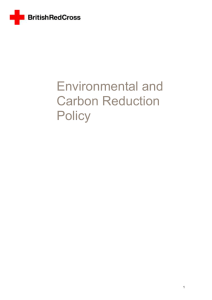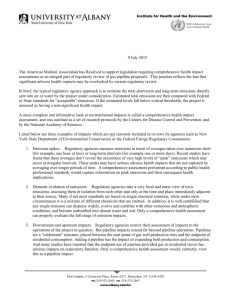Emissions of greenhouse gases in Pamplona decreased by 24% in
advertisement
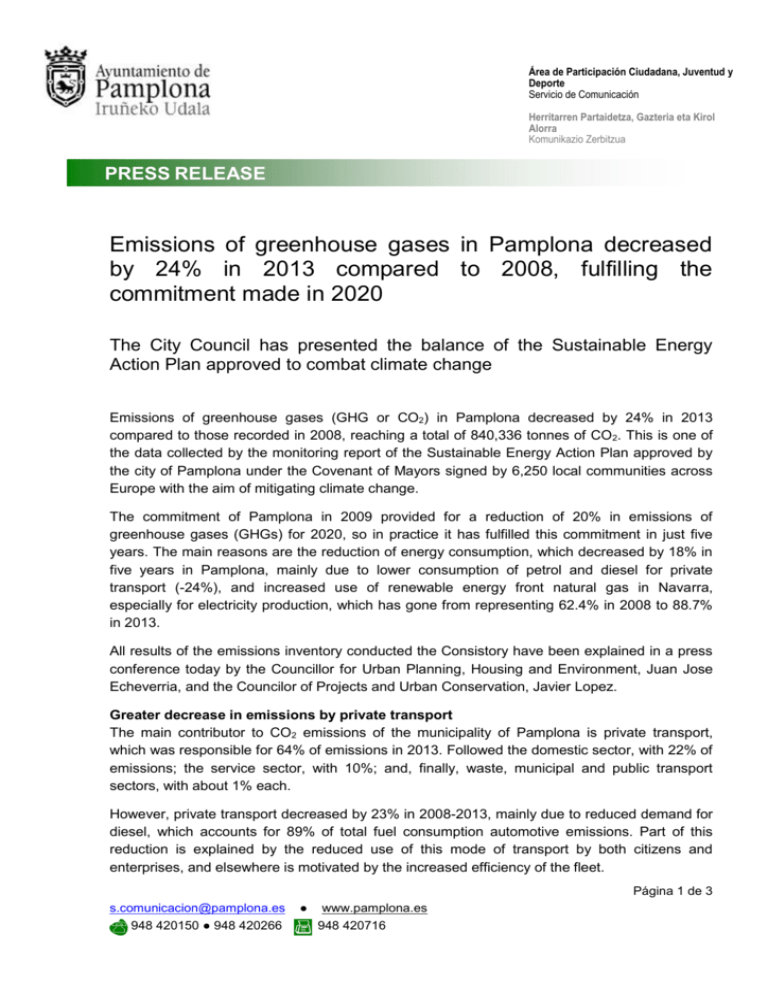
Área de Participación Ciudadana, Juventud y Deporte Servicio de Comunicación Herritarren Partaidetza, Gazteria eta Kirol Alorra Komunikazio Zerbitzua PRESS RELEASE Emissions of greenhouse gases in Pamplona decreased by 24% in 2013 compared to 2008, fulfilling the commitment made in 2020 The City Council has presented the balance of the Sustainable Energy Action Plan approved to combat climate change Emissions of greenhouse gases (GHG or CO2) in Pamplona decreased by 24% in 2013 compared to those recorded in 2008, reaching a total of 840,336 tonnes of CO 2. This is one of the data collected by the monitoring report of the Sustainable Energy Action Plan approved by the city of Pamplona under the Covenant of Mayors signed by 6,250 local communities across Europe with the aim of mitigating climate change. The commitment of Pamplona in 2009 provided for a reduction of 20% in emissions of greenhouse gases (GHGs) for 2020, so in practice it has fulfilled this commitment in just five years. The main reasons are the reduction of energy consumption, which decreased by 18% in five years in Pamplona, mainly due to lower consumption of petrol and diesel for private transport (-24%), and increased use of renewable energy front natural gas in Navarra, especially for electricity production, which has gone from representing 62.4% in 2008 to 88.7% in 2013. All results of the emissions inventory conducted the Consistory have been explained in a press conference today by the Councillor for Urban Planning, Housing and Environment, Juan Jose Echeverria, and the Councilor of Projects and Urban Conservation, Javier Lopez. Greater decrease in emissions by private transport The main contributor to CO2 emissions of the municipality of Pamplona is private transport, which was responsible for 64% of emissions in 2013. Followed the domestic sector, with 22% of emissions; the service sector, with 10%; and, finally, waste, municipal and public transport sectors, with about 1% each. However, private transport decreased by 23% in 2008-2013, mainly due to reduced demand for diesel, which accounts for 89% of total fuel consumption automotive emissions. Part of this reduction is explained by the reduced use of this mode of transport by both citizens and enterprises, and elsewhere is motivated by the increased efficiency of the fleet. Página 1 de 3 s.comunicacion@pamplona.es 948 420150 ● 948 420266 ● www.pamplona.es 948 420716 Área de Participación Ciudadana, Juventud y Deporte Servicio de Comunicación Herritarren Partaidetza, Gazteria eta Kirol Alorra Komunikazio Zerbitzua The domestic sector reduced its emissions by 18% in the same period, mainly by the decrease in electricity consumption (-13%) and heating oil (-9%), while natural gas consumption fell only 1%. In the service sector also declined by 43% its emissions between 2008 and 2013 due to lower energy consumption in general, while the waste sector fell 21% emissions due to lower production of urban waste, which fell 1.28 to 1.02 kg per capita per day. Finally, the public transport sector is the only one to increase its GHG emissions in this period, 64%, even though the energy consumption grew only 5%. This is because in 2013 the buses did not use biodiesel, which the CO2 balance is neutral. In 2008 biodiesel accounted for 35% of total fuel consumption. Since 2009 public buses do not use biodiesel as the local factory which produced it closed. Public transport in Pamplona is managed by a public company in association with 15 municipalities of the metropolitan area of Pamplona. Within the SEAP of Pamplona this company has been encouraged to test electric and hibrid buses, but the results of the tests have been unsatisfactory, so other clean technologies are now under study. 35% less municipal emissions With regard to emissions associated with energy consumption of municipal buildings (offices, schools, sports centers, cultural buildings…), street lighting (lamps, traffic lights, fountains…) and municipal fleet, the city of Pamplona has complied with the commitment also advance to reduce CO2 emissions 20% by 2020, because in that period 2008-2013 these emissions have been reduced by 35%. Among the reasons, the reduction of municipal total energy consumption by 6% and the gradual replacement of heating oil old boilers by natural gas boilers, besides being more efficient, emit less CO2 per unit of energy. By sector, CO2 emissions from municipal buildings were reduced by 27% due to the reduction of electricity consumption by 25% and heating oil by 75%, despite the increased consumption of natural gas in 50% due to boiler replacements. It also highlights the introduction of renewable energy in municipal buildings, solar panels, biomass boilers or geothermal installations whose impact on climate change is considered zero. Also noteworthy is the production of electricity from photovoltaic solar panels, but does not produce a direct saving in consumption. Adding this to the production of electricity from renewable energies in the region, the city of Pamplona in 2013 covered 47% of this consumption with this type of energy compared with 36% in 2008. As for public lighting energy consumption by 7% between 2008 and 2013 was reduced, which, coupled with the reduction of the carbon footprint of electricity in Navarra, led to a reduction in CO2 emissions of 53% in that period. Finally, the municipal fleet fell by 11% and emissions by 10% in the five years consumption. Citizen participation in the fight against climate change The European Commission launched in 2009 an initiative called 'Covenant of Mayors', that seeks the participation of citizens in the fight against global climate change because it believes Página 2 de 3 s.comunicacion@pamplona.es 948 420150 ● 948 420266 ● www.pamplona.es 948 420716 Área de Participación Ciudadana, Juventud y Deporte Servicio de Comunicación Herritarren Partaidetza, Gazteria eta Kirol Alorra Komunikazio Zerbitzua that cities must lead the implementation of sustainable energy policies and should support their efforts. The Covenant is a permanent network grouping the most active cities in Europe willing to comply with a formal commitment to combat the climate change. This pact involves the commitment of cities and towns to adhere to achieving the EU targets to reduce CO2 emissions through energy efficiency actions and activities related to renewable energy. Pamplona City Council signed in February 2009 accession to the Covenant of Mayors along with 372 other European cities, whereby they adopted the commitment to go beyond the objectives set by the EU for 2020, reducing CO2 emissions in our respective territories by at least 20% by implementing an Sustainable Energy Action Plan. They also committed to develop a baseline emissions inventory as a basis for the Sustainable Energy Plan of Action; to present the Sustainable Energy Action Plan within one year from the official signing of the Covenant of Mayors; to adapt city structures, including allocation of sufficient human resources to develop the necessary actions; to mobilize civil society in the respective regions to participate in the development of the Action Plan, outlining the policies and measures necessary for the implementation and fulfillment of the objectives of the Plan; to submit a progress report at least every two years from the approval of the Action Plan for evaluation, monitoring and control; to share experiences and expertise with territorial units; to organize an 'Energy Day "or" Day of the Covenant of Mayors' so that citizens benefit directly from the opportunities and advantages offered by a more intelligent use of energy and to inform the media local on the development of the action plan; to attend and participate in the Conference of Mayors for a Europe EU Sustainable Energy to be held annually; and to spread the message of the Covenant in the appropriate fora and in particular encourage other mayors to join the Covenant. Pamplona, March 24, 2015 Página 3 de 3 s.comunicacion@pamplona.es 948 420150 ● 948 420266 ● www.pamplona.es 948 420716
